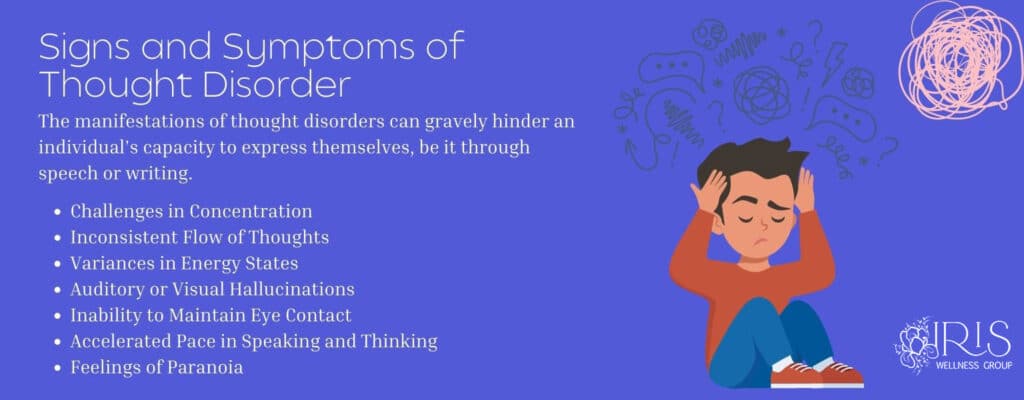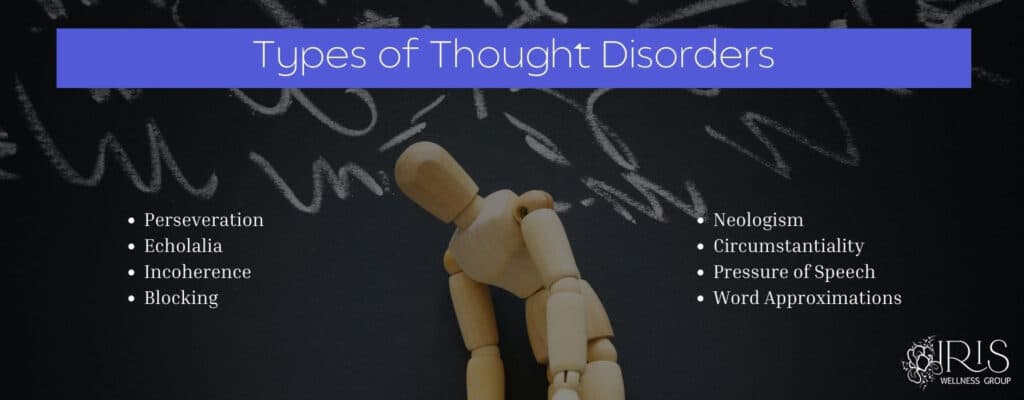Table of Contents
What are Thought Disorders?
Thought disorders are complex mental health conditions characterized by abnormal cognitive disturbances affecting a person’s ability to think, communicate, and interact normally. According to the National Institute of Mental Health, roughly 1% of the U.S. adult population suffers from thought disorders, such as schizophrenia or brief psychotic disorder. These disorders manifest in three primary symptom categories:
- Positive symptoms include altered perceptions, such as hallucinations, and concerns for personal safety. Individuals may also struggle to organize their thoughts or speak coherently.
- Negative symptoms encompass reduced motivation to engage in daily activities or social interactions, decreased pleasure derived from routine activities, and diminished speech.
- Cognitive symptoms involve challenges in processing information, managing complex tasks, and maintaining focus or attention.
Thought disorders, while closely associated with schizophrenia due to its disorganized thinking patterns, aren’t exclusive to it. They can also emerge in mood disorders, such as bipolar disorder or major depressive disorder, and are linked with neurological issues like dementia. These disorders severely disrupt an individual’s communication abilities, evident in their speech. A person might swiftly jump between topics, give unrelated answers, or mix words that don’t form logical sentences.
If left untreated, thought disorders can hinder meaningful activities like work or education and strain interpersonal relationships. However, with appropriate intervention—typically a combination of medication and therapy—many individuals with thought disorders can lead fulfilling, productive lives. If you suspect someone might be grappling with a thought disorder, it’s imperative to seek professional assistance, ensuring they receive the necessary support and treatment.
What Causes Thought Disorder?
The origins of thought disorder remain ambiguous. While it’s not exclusively linked to a specific condition, it frequently appears in individuals with schizophrenia and various other mental health issues. The roots of schizophrenia, too, are unclear, but a mix of biological, genetic, and environmental aspects are believed to play a role.
Given its broad definition and diverse symptoms, pinpointing a single cause for thought disorder is challenging. The academic community is in active discussion regarding potential triggers for its symptoms. Some theories suggest alterations in the language-centric regions of the brain, while others argue it might arise from issues in broader brain areas.

Symptoms of Thought Disorders
The manifestations of thought disorders can gravely hinder an individual’s capacity to express themselves, be it through speech or writing. It’s pivotal to understand that the presentation of these symptoms varies from person to person, necessitating a tailor-made diagnostic approach.
Indicators of a potential thought disorder encompass:
- Challenges in concentration or susceptibility to distractions.
- Tendency to speak in a disjointed manner, often termed “incoherence”.
- Inconsistent flow of thoughts.
- Abrupt and ambiguous topic shifts, frequently labeled as “loose associations”.
- Observable alterations in physical movement.
- Variances in energy states.
- Predilection to distance oneself from social interactions.
- Experiencing auditory or visual hallucinations.
- Entertaining delusional beliefs or grandiose notions (for instance, “I’m the nation’s leader.”).
- Feelings of paranoia or convictions of persecution like, “They are plotting against me.”
- Restricted ability to self-reflect and make judgments.
- Emotionless demeanor, voice tone, or facial reactions.
- Inability to maintain eye contact or a propensity to gaze absently.
- Accelerated pace in speaking and thinking, sometimes leading to muddled speech.
- Oscillating moods, spanning depressive to euphoric states.
- Enhanced levels of irritability.
- Engaging in hazardous or impulsive actions.
- Amplified consumption of substances, encompassing narcotics or alcohol.
Risk Factors of Thought Disorder
Risk factors that can heighten the likelihood of developing a thought disorder include:
- Mood Disorders: Persistent emotional states that profoundly affect a person’s behavior. Those with mood disorders oscillate between emotional extremes and often feel perpetual depression, increasing their risk of thought disorders.
- Bipolar Disorder: A type of mood disorder, formerly called manic depression, marked by severe mood, energy, and concentration swings, which can disrupt daily functioning.
- Depression: Persistent feelings of sadness and disinterest in daily activities, making individuals more prone to thought disorders.
- Traumatic Brain Injury (TBI): Commonly caused by a significant head impact or objects like bullets penetrating the brain. Even mild TBI can affect the thought process.
- Anxiety: Overwhelming worry or fear that can hinder daily activities and thought coherence, often symptomatic of various mental health conditions.

Types of Thought Disorders
At our dual diagnosis treatment facility, we encounter individuals grappling with a mix of mental health challenges and addiction concerns. Our aim is to enlighten you about various thought disorders, empowering you to recognize signs in your loved ones and seek timely intervention.
- Perseveration: Characterized by an obsessive repetition of words or topics.
- Echolalia: This sees the individual echoing phrases spoken to them.
- Incoherence: Often termed “word salad,” this disorder scrambles the arrangement and meaning of words, leading to disjointed speech.
- Blocking: Here, an individual is frequently interrupted by pauses, making it hard for them to finish their thoughts.
- Neologism: This involves inventing new words or phrases during conversation.
- Circumstantiality: Marked by long-windedness, speakers drift into unrelated detours before returning to their primary subject.
- Pressure of Speech: Those affected speak rapidly and loudly, making it tough to interject.
- Word Approximations: This involves the unusual or incorrect insertion of words within sentences.
Are you worried about a loved one’s mental well-being? Our mental health PHP could provide the essential support they require to address their challenges.
How are Thought Disorders Treated?
Treatment for thought disorders isn’t universally applicable, as it must be tailored to each individual’s distinct condition. Nevertheless, there are common strategies, primarily medication and therapy.
Medications for Thought Disorder
Medications, such as antipsychotics for schizophrenia, antidepressants for depression, or antianxiety drugs for bipolar disorder, aim to manage symptoms by balancing brain chemicals like dopamine and serotonin.
Therapies for Thought Disorder
Therapy is equally vital, with Cognitive Behavioral Therapy (CBT) being particularly beneficial. CBT enables individuals to identify and alter unhelpful patterns in their thinking, emotions, and behaviors. Other therapeutic approaches include talk therapy, family therapy, and cognitive enhancement therapy, especially useful for conditions like schizophrenia.
While antipsychotic medications have traditionally been a go-to treatment, taken daily over extended periods, they might not eliminate symptoms completely for everyone. Their effectiveness often manifests as reduced symptom intensity and frequency. However, with growing evidence, talk therapy, especially CBT, has emerged as an equally potent tool, aiding patients in improving functionality and symptom management.
For anyone suspecting they or someone they know might have a thought disorder, early diagnosis and treatment are crucial. Seeking help from mental health professionals is imperative. Such disorders can be managed effectively, enabling individuals to lead healthy, productive lives. And remember, seeking assistance is a strength, not a sign of weakness. If you’re grappling with a thought disorder, Iris Wellness Group can provide valuable insights. Always encourage loved ones to get medical attention if they show signs, ensuring they get the best-suited treatment for their condition.
Start Your Thought Disorder Treatment in Chattanooga, Tennessee Today!
Treatment of Thought Disorder at Iris Wellness Group
Should you or someone close to you display symptoms of a thought disorder, consider reaching out to Iris Wellness Group. Utilizing proven, evidence-based approaches like cognitive behavioral therapy (CBT), Iris Wellness Group offers comprehensive thought disorder treatment in Chattanooga, TN and it’s surrounding areas.
Our techniques have a track record of assisting individuals in navigating thought disorders and achieving sustained recovery. Our dedicated recovery team tailors a unique care plan for you, combining evidence-backed therapeutic methods with a holistic approach.









